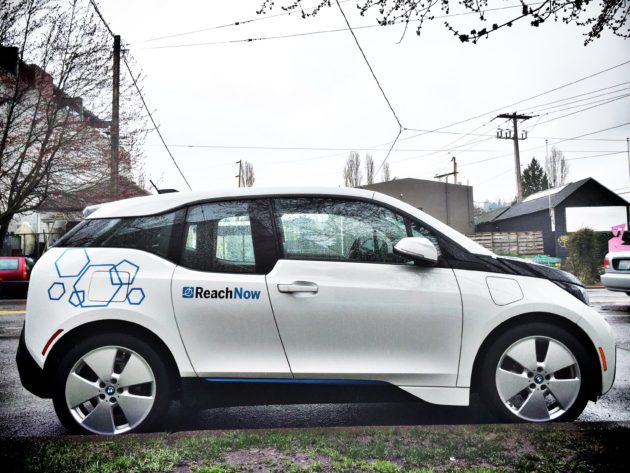FILE PHOTO: A man is seen in front of a Didi sign before a promotional event of its Hitch service for the Spring festival travel rush, in Beijing, China January 24, 2018. REUTERS/Stringer/File Photo BEIJING/SHANGHAI (Reuters) – Chinese ride-hailing giant Didi Chuxing said on Thursday it was proposing to relaunch its Hitch carpooling service with… Continue reading China’s Didi plans to relaunch Hitch service with new safety features
Tag: Uber
BMW ReachNow car-sharing service shuts down in Seattle and Portland following joint venture deal
BMW’s ReachNow will shut down today. (GeekWire Photo / Kurt Schlosser) Peace out, ReachNow. BMW’s car-sharing service abruptly ceased operation Wednesday, ending a mobility program that included 1,000 free-floating vehicles used by more than 100,000 members across Seattle and Portland. A spokesperson confirmed that ReachNow offices in those two cities will close in the next… Continue reading BMW ReachNow car-sharing service shuts down in Seattle and Portland following joint venture deal
Uber-backed study touts benefits of downtown tolling in Seattle as ride-share industry pushes for congestion pricing
Seattle traffic along 2nd Avenue. (Flickr Photo / Oran Viri) The concept of downtown tolling to reduce congestion is gaining momentum. Cities like Singapore and Stokholm have implemented congestion pricing and significantly increased transit ridership in their urban cores. New York City will become the first in the U.S. to launch a similar program. Could… Continue reading Uber-backed study touts benefits of downtown tolling in Seattle as ride-share industry pushes for congestion pricing
Uber launches in Hamburg, now live in six German cities
FILE PHOTO: Screens display the Uber Technologies Inc. logo on the floor of the New York Stock Exchange (NYSE) during the company’s IPO in New York, U.S., May 10, 2019. REUTERS/Andrew Kelly/File Photo FRANKFURT (Reuters) – Uber said on Wednesday it was launching ride-hailing services in Germany’s second city, Hamburg, as it seeks to achieve… Continue reading Uber launches in Hamburg, now live in six German cities
One of Uber’s flying taxi partners just raised a $25 million Series A round
Uber Air, the transportation company’s upcoming flying taxi service, needs vehicle partners in order to make it a reality. Karem Aircraft, which Uber partnered with last year, has just raised a $25 million Series A round for its new air taxi spin-off. The round was led by Korean industrial conglomerate Hanwha Systems. “Karem’s technology for… Continue reading One of Uber’s flying taxi partners just raised a $25 million Series A round
New York City can ban ads inside Uber, Lyft vehicles–US appeals court
FILE PHOTO: Uber and Lyft signs are seen on a car in Redondo Beach, California, U.S., March 25, 2019. REUTERS/Lucy Nicholson NEW YORK (Reuters) – A federal appeals court on Tuesday said New York City can ban advertising inside vehicles for companies such as Uber and Lyft. Reversing a lower court ruling, the 2nd U.S.… Continue reading New York City can ban ads inside Uber, Lyft vehicles–US appeals court
Laying the groundwork for self-driving vehicle safety
By: Eric Meyhofer, CEO of Uber Advanced Technologies Group Around the world, regulators, technology developers, and industry standard-setting bodies are already working on a range of approaches to self-driving vehicle safety. However, the complexity of self-driving technology and the variety in development approaches across the industry means that, to date, no single standard or test… Continue reading Laying the groundwork for self-driving vehicle safety
Yandex-Uber JV MLU acquires regional rival Vezet for shares and $71.5M in cash
On-demand transportation giant Uber made its name in part by aggressively entering new markets on a path of organic growth, but in recent times, it has shown itself more amenable to the concept of expansion through acquisition. Today, MLU, Uber’s ride-sharing and food delivery JV with Yandex (by way of Yandex.taxi) covering cities in Russia… Continue reading Yandex-Uber JV MLU acquires regional rival Vezet for shares and $71.5M in cash
UPDATE 2-Yandex’s joint venture with Uber to buy smaller Russian taxi firm’s assets
MOSCOW (Reuters) – Russian internet company Yandex’s (YNDX.O) joint venture with Uber (UBER.N) has agreed to buy Russian taxi firm Vezet’s core business, further cementing Yandex’s role as a major online taxi operator in Russia and neighboring countries. Taxi, ride sharing and car sharing services have been booming in Russia over the last couple of… Continue reading UPDATE 2-Yandex’s joint venture with Uber to buy smaller Russian taxi firm’s assets
Yandex, Uber JV to buy Vezet’s Russian assets in expansion push
Russian internet company Yandex NV said on Monday its ride-sharing and food delivery joint venture with Uber had agreed to buy intellectual property and local call centres from Vezet group as it plans further expansion in the country. Yandex and Uber Technologies Inc combined their taxi businesses across Russia, Armenia, Azerbaijan, Belarus, Georgia and Kazakhstan in 2017… Continue reading Yandex, Uber JV to buy Vezet’s Russian assets in expansion push


